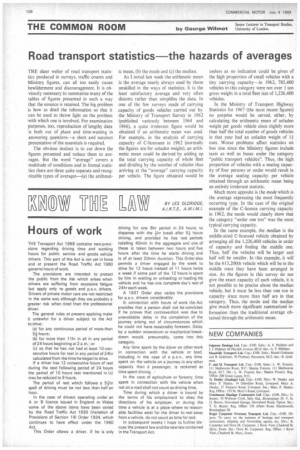H ours of work
Page 108

If you've noticed an error in this article please click here to report it so we can fix it.
THE Transport Act 1968 contains new provisions regarding driving time and working hours for public service and goods vehicle drivers. This part of the Act is not yet in force and at present the Road Traffic Act 1960 governs hours of work.
The provisions are intended to protect the public from the risk which arises when drivers are suffering from excessive fatigue but apply only to goods" and p.s.v. drivers. Drivers of private motor cars are not restricted in the same way although they are probably a greater risk when tired than the professional driver.
The general rules at present applying make it unlawful for a driver subject to the Act tordrive: (a) for any continuous period of more than 5+ hours; (b) for more than 11 hr in all in any period of 24 hours beginning at 2 a. rn.; or (c) so that he has not had at least 10 consecutive hours for rest in any period of 24hr calculated from the time he began to drive, If a driver has 12 consecutive hours of rest during the next following period of 24 hours the period of 10 hours rest mentioned in (c) may be reduced to 9 hours.
The period of rest which follows a 51hr spell of driving must be not less than half an hour.
In the case of drivers operating under an A or B licence issued in England or Wales some of the above items have been varied by the Road Traffic Act 1930 (Variation of Provisions of Section 19) Order 1934, which continues to have effect under the 1960 Act.
This Order allows a driver, if he is only
driving for one 8hr period in 24 hours, to dispense with the Ihr break after 5+ hours driving, and provided he has rest periods totalling 40min in the aggregate and one of these is taken between two hours and five hours after the time he starts driving and is of at least 20min duration. This Order also permits a driver engaged by the week to drive for 12 hours instead of 11 hours twice a week if some part of the 12 hours is spent by him in waiting or unloading or loading his vehicle and he has one complete day's rest of 24hr each week,
A 1937 Order also varies the provisions for p.s.v. drivers considerably.
In connection with hours of work the Act provides that a person shall not be convicted if he proves that contravention was due to unavoidable delay in the completion of the journey arising out of circumstances which he could not have reasonably foreseen. Delay by a sudden snowstorm or mechanical breakdown would, presumably, come into this category.
Any time spent by the driver on other work in connection with the vehicle or load, including in the case of a p.s.v., any time spent on the vehicle on a journey in any other capacity than a passenger, is reckoned as time spent driving.
In the case of agriculture or forestry, time spent in connection with the vehicle when not on a road shall not count as driving time.
Time during which a driver is bound by the terms of his employment to obey the directions of his employer, or during the time a vehicle is at a place where no reasonable facilities exist for the driver to rest away from a vehicle, do not count as time for rest.
In subsequent weeks I hope to further discuss the present law and the new law contained in the Transport Act,




























































































































































